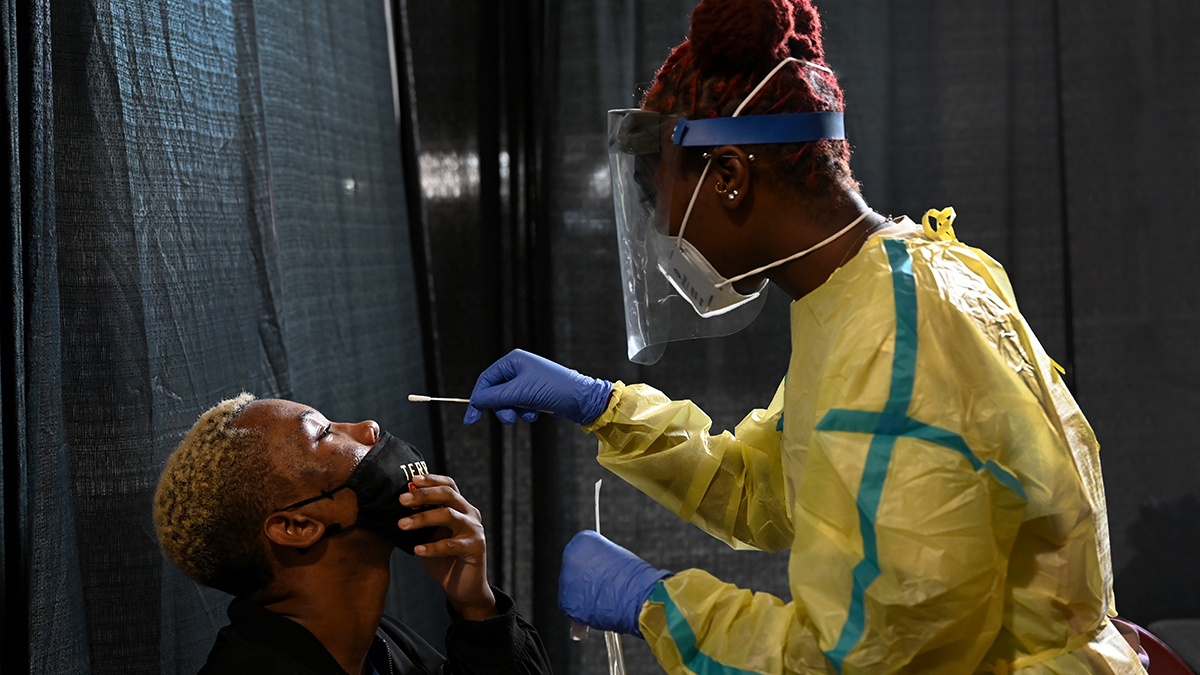Back-to-school season is heating up in the D.C. area, and so is one Maryland company's COVID-19 vaccine trial.
Vaccine development company Novavax, based in Gaithersburg, is initiating phase two trials of a coronavirus vaccine, in which the shot will be administered to about 1,500 volunteers in the U.S. and Australia. About half of recipients will be adults between 60 and 84.
The trial will primarily test the vaccine's safety and whether it provokes an immune response, but researchers will also preliminarily assess the efficacy.
Life sciences companies in Maryland have secured more than $3 billion toward vaccine development, Gov. Larry Hogan said.
Fall semester is officially underway at Catholic University, but first the students who are living in campus housing must complete a two-week quarantine. After that, some in-person classes are expected to move forward.
American University and George Mason University are starting online — on the same day a major Zoom outage stopped online classes for some.
Culpeper County Public Schools will also start a blended online and in-person school year on Monday. Fauquier and Falls Church City Schools will begin classes entirely virtually.
We're making it easier for you to find stories that matter with our new newsletter — The 4Front. Sign up here and get news that is important for you to your inbox.
What the Data Shows
The D.C. area is on a downward trend — and that's a good thing.
New coronavirus case diagnoses are still trending down, despite Saturday's load of 1,780 for the whole region being a slight uptick.
Seven-day average caseloads are still low in each area: 52 in D.C., 565 in Maryland and 822 in Virginia.
Positivity rates are another promising sign. The proportion of COVID-19 tests coming back positive is 2.9% in D.C., 3.1% in Maryland and down to 6.4% in Virginia. Many areas across the country have set goals to be below 5% or 10% on this metric.
The map below shows the number of coronavirus cases diagnosed per 1,000 residents.
Coronavirus Cases in DC, Maryland and Virginia
COVID-19 cases by population in D.C. and by county in Maryland and Virginia
Source: DC, MD and VA Health Departments
Credit: Anisa Holmes / NBC Washington
Local Coronavirus Headlines
- Virginians on unemployment will get an extra $300 on top of what the state pays out. Read more.
- Special needs students are among the first groups who should get in-person instruction, Fairfax County school officials say. Read more.
- Montgomery County officials said in an update Wednesday that testing will resume at county sites using test kits from the state. Testing was suspended last week after the state health department ordered the county stop using saliva tests from a Rockville lab. Read more.
- The federal government has started sending new COVID-19 testing systems to nursing homes around the country in hopes that the rapid results provided by antigen tests will slow the spread of the virus. Long-term care facilities certainly welcome that assistance, but some have major concerns about those tests. Get the News4 I-Team report.
- Most people recently diagnosed with the coronavirus in D.C. had no known contact with someone who had the virus and did not attend events or travel, new data from the city says. Read more.
- Montgomery County residents who have been hit financially hard by the coronavirus pandemic can apply for short-term rental assistance. The application is open through Aug. 31.
- Metrorail service has increased to the highest levels since the pandemic began – and more stations are opening soon. Read more.
- Virginia Gov. Ralph Northam unveiled a plan for limited new spending on blocking evictions, boosting high-speed internet access and more. Read about the plan.
Reopening Tracker
- Private and parochial schools in Maryland can choose when to reopen after a back-and-forth between county health officials and the governor. Read more.
- Prince George's County is revising its phase two reopening executive order due to an uptick in coronavirus cases, according to the county executive's office.
- Virginia entered phase three reopening on July 1, loosening restrictions on restaurants, stores, gyms and pools. Northam said more restrictions could be implemented if cases continue to grow.
- Prince George's County entered full phase two on June 23, allowing the MGM Casino and gyms to reopen.
- D.C. entered phase two on June 22, allowing indoor dining, gyms, libraries and houses of worship to reopen with restrictions.
- Montgomery County entered phase two on June 19, reopening with restrictions gyms, houses of worship, indoor dining and retail.
- Maryland entered phase two of reopening on June 10, permitting indoor dining, outdoor pools and outside amusements to reopen.
How to Stay Safe
There are ways to lower your risk of catching coronavirus. Here are guidelines from the CDC:
- Wear a snug-fitting mask that covers your nose and mouth.
- Avoid being indoors with people who are not members of your household. The more people you are in contact with, the more likely you are to be exposed to COVID-19. If you are indoors with people you don’t live with, stay at least six feet apart and keep your mask on.
- Wash your hands often, especially after you have been in a public place.
Sophia Barnes, Andrea Swalec and Anisa Holmes contributed to this report



